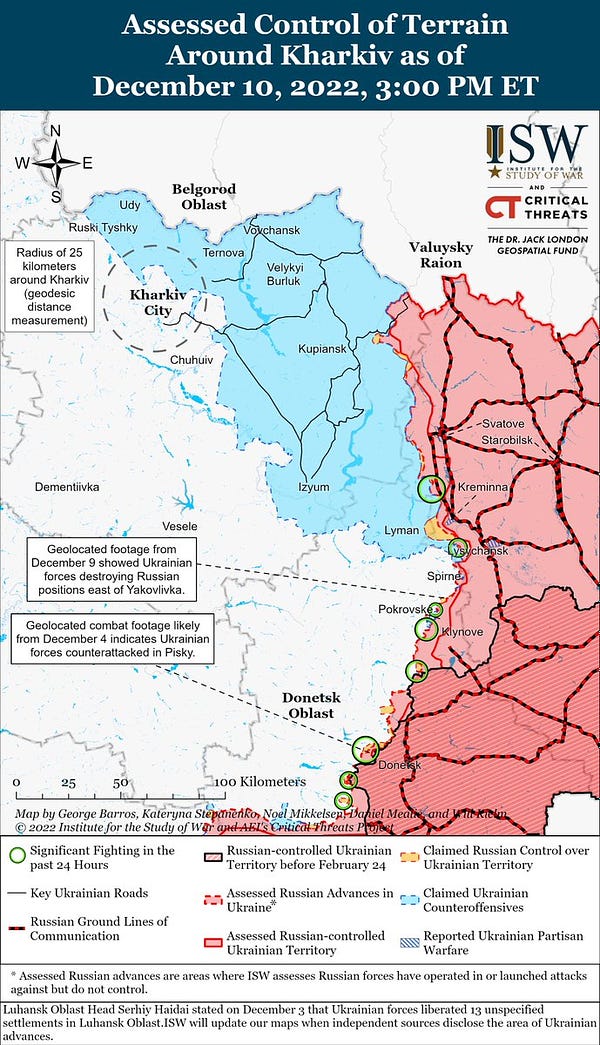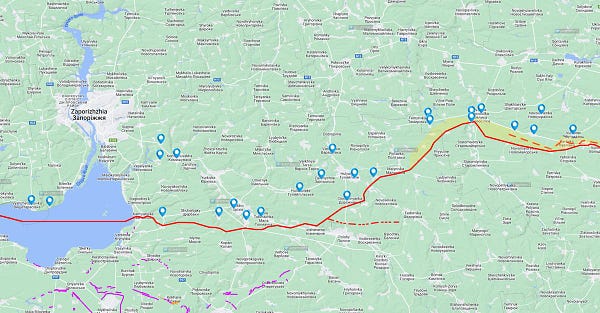While some remain concerned about the lack of movement similar to the late/summer early fall Ukrainian counteroffensives, the reality is that such 'sudden' successes are always the result of painstaking preparation over months.
The Ukrainians appear to again be targeting Russian logistics, command centers and the occasional opportunistic strike such as that on a Wagner barracks in Melitopol. Bakhmut is another example of this as Ukraine provides just enough resistance to encourage the Russians to think they are close to a win while all they doing is falling into the trap of wasting scarce resources. JL
Phillips O'Brien reports in his substack/newsletter:
What is most likely to occur is a more concerted wasting campaign of the kind we saw in Kherson. It’s a methodical campaign of trying to waste Russian forces before risking an attack, (it's) accelerated attrition. We will probably see something similar again. It could take even more time, (but) as long as their intelligence remains as good as it seems to be, they should be able to execute. As for Bakhmut, the continual Russian assaults kept coming. But as they cant envelope it and cut off supply, its hard to see it moving on from the high casualty wasting operation that it is
On the battlefield of Ukraine little changed this last week. There were some tiny changes in the lines around Bakhmut, but once again the Russians are really not close to taking the city. There were also some small changes in Ukraine’s favor in the northeast near Svatove, but again these alterations were pretty small. This has basically been the position since the Russians were forced to pull back across the Dnipro in Kherson Oblast in October.
The Institute for the Study of War’s update earlier today has some good maps of where things stand.
Eastern #Ukraine Update: Ukrainian forces continued counteroffensive operations toward #Svatove, and #Russian and Ukrainian forces conducted ground attacks near #Kreminna. /1 isw.pub/UkrWar121022In terms of the change of the line, the most important thing to look for in the coming weeks is whether Ukraine begins a concerted effort anywhere. That will probably not involve some mass armor assault at first, for we have still not had a single armored breakthrough against a well defended position anytime in this war. The tank as the leader of a breakthrough against opposition has not happened in any meaningful way, and is unlikely to happen in the short term as the Russians have a much shorter line to defend.
Instead, what is most likely to occur is a more concerted wasting campaign of the kind we saw in Kherson. It’s a methodical campaign of trying to waste Russian forces before risking an attack. When it first started happening around Kherson, I termed it a form of accelerated attrition.
I think we will probably see something similar to this again. Only it could take even more time, as the Ukrainians don’t have the Dnipro helping them cut off Russian supplies. That being said, as long as their intelligence remains as good as it seems to be, they should be able to execute something similar. Pay attention to increases in fire (on both sides) on certain parts of the line. Noticed that @DefMon3 recorded an increase in Russian fire in the centre of the line yesterday. As he says, this could be unimportant, but if it lasts for a few days, could indicate a pick up of activity in this area.
The shelling pattern is deeper than usual along the southern frontline. This could indicate UA troop accumulations. It could also be a coincidence.As for Bakhmut, the continual Russian assaults kept coming. Again the Russians seem to be attacking basically all sides around the town, but as they cant envelope it and cut off supply, its hard to see it moving on from the high casualty wasting operation that it is. There have been a number of stories in the international press about it, if you want to read more. Probably the best was this by Christopher Miller. There is a thread attached in case you don’t have access to @FT.
Escalation and the international context: Nuclear weapons and civilian bombardment.
That doesn’t mean things have settled down. In many ways it’s the international context of the war that is becoming the most important at present. This war is an unusual one because of the importance of international actors to the affect both sides. Outside actors can certainly affect the course of the war by allowing or denying the supply of certain support. This has caused what seems to be a great deal of internal debate in the Biden administration. They obviously seem to think that they want to limit the reach of Ukrainian forces, to keep the Ukrainians from launching attacks over the border into Russia for instance. There was a story in the Wall Street Journal that the Biden Administration has specifically modified the HIMARS provided to Ukraine so that they cant fire into Russia.
Of course, such plans in war usually fall flat. Ukraine seem willing to execute strikes deeper into Russia than expected, and during the past week they launched a range of these including the well publicized attacks on Russian strategic bombers.
The interesting things from the reporting on these, which rather contravenes what is in the Wall Street Journal report, is that its now being said that the US is becoming less worried about Russian escalation, in particular escalation to the use of tactical nuclear weapons, which is what many people have been wondering about for months
https://www.thetimes.co.uk/article/ukraine-drone-warfare-russia-732jsshpx
This article in the Times made a few points. Russian attacks on Ukrainian civilians have (predictably as I said a while back) opened the door for counter escalation.
Ive written about how this campaign is probably counterproductive for Russia, very expensive, makes the Ukrainians more determined and will actually lead to more support for Ukraine (particulary in anti-air) than before.Now the really interesting thing, at least to me, is what seems to be the decrease in worry about a Russian escalation to the use of nuclear weapons. I tweeted about this two days ago, and said I would address it in this weekend’s update.
Interesting to see the disappearance of the Realists and other Puton apologists who were saying a few months ago that Russian demands should be acceded to because of the nuclear threats. I think they once again misunderstood power relationships (realists seem to do that).Actually I’ve spent some time the last few days looking into this, and its fascinating. Its been so interesting, actually, that I’m putting together an article for The Atlantic, which I hope to finish soon. What is interesting to see is how the voices in the west who have been claiming that Russia not only might, but in some cases almost certainly would use nuclear weapons, have gone relatively quiet.
There was an extraordinary peak in that rhetoric back in October (fascinatingly just as the Russians were desperately trying to hold onto Kherson). A range of figures (primarily Trump supporters including Trump himself and hard core Brexiteers such as Dominic Cummings and Nigel Farage) all started pontificating about how Putin might soon resort to nuclear weapons. Here are some stories.
In speaking this way, those talking about Putin going nuclear were speaking identically (no surprise) to those ‘Realists’ such as Mearsheimer and Walt who first told us Russia such a strong great power that Ukraine should be sacrificed to Russia and are now saying Russia is such a crazy power that Ukraine should be sacrificed to it.
Anyway this crescendo of warnings about how Putin would go nuclear did reach a crescendo in October, and then true realism appeared. Powers that actually matter, including India and China starting making their displeasure at all this nuclear sabre rattling apparent. And guess what, there was almost an instant decline in that sabre rattling.
Just one example, by the middle of November Chinese sources were confirming that President Xi had told Biden that the Chinese were determined not to see nuclear weapons used in Ukraine.
btw, this only makes sense for a number of reasons that Im developing in the next Atlantic piece.
The reality is that Putin using nuclear weapons, which Trump, Farage, Cummings and Elon Musk all say is something that could happen unless Russia is given a deal that Putin wants over Ukraine, is extremely unlikely, for the international context as much as anything else. If Putin were for some reason to go down the nuclear route, it would further weaken an already weakened Russia.


























0 comments:
Post a Comment